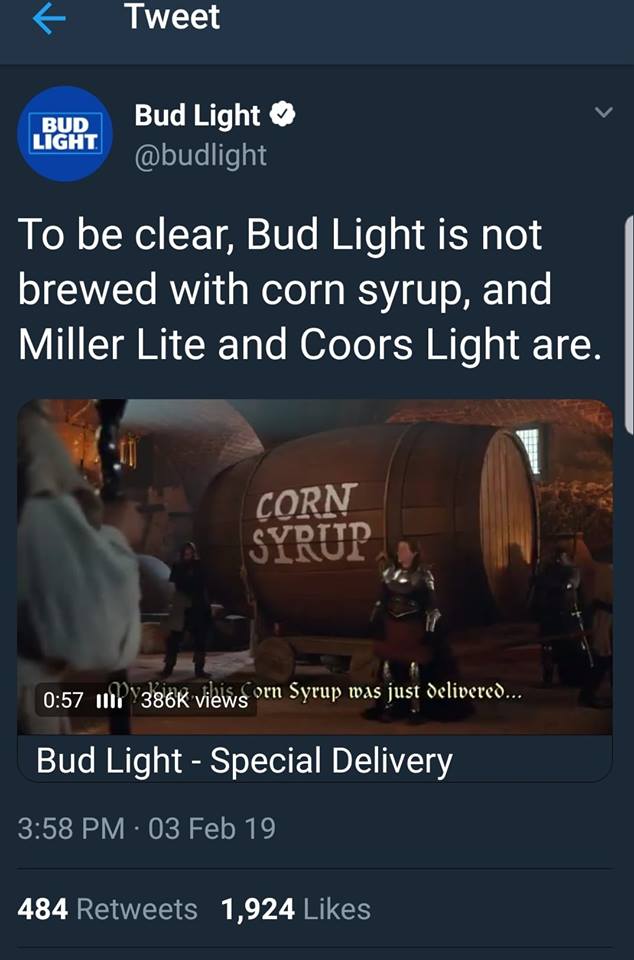However, I am going to debunk junk science and their suggestion that because they use one type of sugar to help yeast and their competitor uses another theirs is superior.
The Bud Light advertisement chides Coors Light for using corn syrup. If you are not aware of it, a lot of sugar is from corn, beets, rice, etc. rather than just sugar cane, which is very resource intensive to grow. But it isn't just cost, artisan beer brewers also use corn syrup for priming because corn sugar dissolves easier in water than table sugar; but to yeast it is the same fuel.
Priming sugar adds no taste
In beer, unless you are using a sugar with a profound flavor (molasses) or intentionally picking one that the yeast won't consume (lactose), you are not getting any different or sweeter taste because the sugar is only there to feed yeast which will provide the alcohol and the bubbles. Priming sugar adds no taste, it is fully fermentable be it table sugar or corn syrup.
So why did Bud Light make such a big deal out of it?

Everyone has heard of the placebo - a sugar pill or water you are told does something magical (as in Zicam or other homeopathy) and because you think it does something magical, around 29 percent of people will claim to have an effect. This placebo effect is so real - some things are all in our heads - that for a drug to advance to get approvals it must show it works, and that means giving people in clinical trials a placebo.
Bud Light is selling a nocebo - and forcing competitors to react to it
The other side of that is the nocebo - where consumers are told a product does not have something in order to make them feel better. When people are told a product does not have something, some people do like it more, or feel healthier, even if they didn't know whether or not the thing missing is harmful.
Ironically, a common placebo, sugar, is being used as a nocebo too. Americans are pretty far removed from agriculture these days. So if Whole Foods claims a product has "no added sugar" but then lists an ingredient like "evaporated cane juice" a whole lot of people feel healthier about buying it, even though when you evaporate cane juice, you get sugar. Whole Foods invented a new name for sugar so they could claim not to add sugar and people felt healthier. The FDA, however, was not amused.
Sugar can do many things, it will not make alcohol healthier
So it is with Bud Light telling the public they have no corn syrup. To people who make beer, so what? It's still sugar and it can lighten beer, or make more alcohol, or create a sweeter taste if other parts of the brewing process are modified for that reason, but that has nothing to do with being cane sugar or corn syrup.
Yet the marketing campaign may work, even if the type of sugar makes zero difference in Bud Light or Coors Light or Miller. We live in a country where people buy Pink Himalayan Non-GMO Rock Salt. It's salt, it's not an organism that can be genetically modified, and it isn't even from the Himalayas, but people still overpay for it because they believe what advertising tells them to believe.
Bud Light just has to hope their customers are as uninformed about science as Whole Foods shoppers are.
Belgians have to be chuckling at this new controversy in America, since they literally use liquid candi sugar, and Anheuser–Busch InBev, the company that owns Budweiser, is headquartered there.




Comments